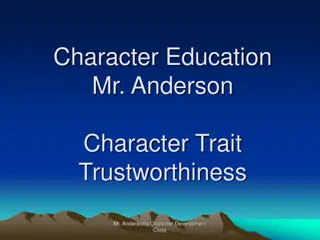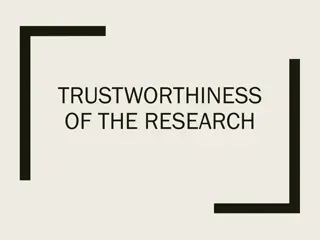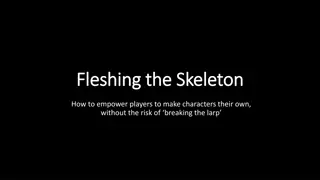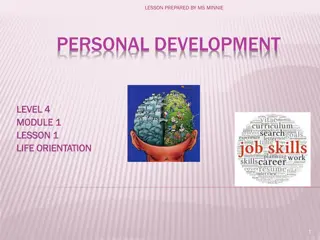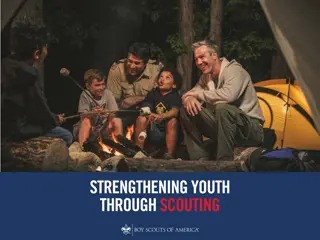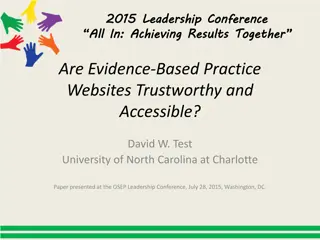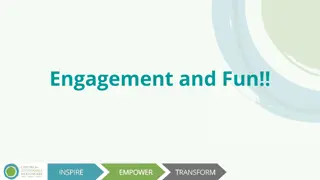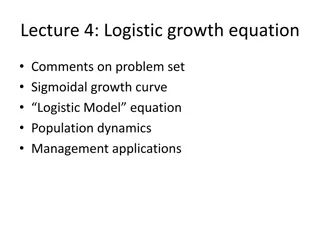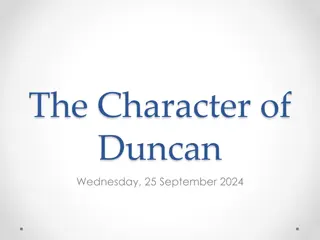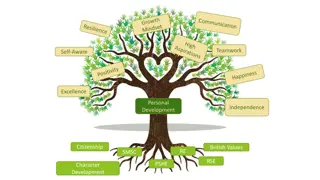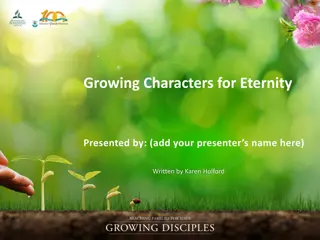Exploring Character Development and Trustworthiness for Personal Growth
Understand the importance of character in defining oneself, determining success, and fostering trustworthiness. Explore concepts like fairness, caring, and citizenship in personal development. Reflect on self-evaluation regarding trustworthiness and ethical behavior for a fulfilling and successful life.
Uploaded on Oct 03, 2024 | 0 Views
Download Presentation

Please find below an Image/Link to download the presentation.
The content on the website is provided AS IS for your information and personal use only. It may not be sold, licensed, or shared on other websites without obtaining consent from the author. Download presentation by click this link. If you encounter any issues during the download, it is possible that the publisher has removed the file from their server.
E N D
Presentation Transcript
Character Character Development Development What kind of person are you? Version : a Written by: Mack Moore Edited by:GAC 10/3/2024 1
Discussion Outline/Syllabus Discussion Outline/Syllabus What Does Success Mean to You? Teaching Method: Small group discussion, role play Discussion Objectives: Understand that character determines who you are and how you are viewed How you are viewed determines whether you are happy and successful Doing the right thing consistently has benefits
Character Development Character Development trustworthy trustworthy adjective- trust wor thy \ tr st- w r-th \ Definition - able to be relied on to do or provide what is needed or right: deserving of trust respect noun re spect \ri- spekt\ Definition - a feeling of admiring someone or something that is good, valuable, important, etc. responsibility noun re spon si bil i ty \ri- sp n(t)-s - bi-l -t \ Definition - the state of being the person who caused something to happen This Photo by Unknown Author is licensed under CC BY-SA Version : a Written by: Mack Moore Edited by:GAC 10/3/2024 3
Character Development Character Development Fairness Fairness adjective \ fer\ess Definition - agreeing with what is thought to be right or acceptable Caring Caring Intransitive verb \ ker\ Definition - to feel interest in something: to be interested in or concerned about something: to feel affection for someone Citizenship noun cit i zen ship \ si-t -z n- ship\ Definition - the qualities that a person is expected to have as a responsible member of a community This Photo by Unknown Author is licensed under CC BY-SA Version : a Written by: Mack Moore Edited by:GAC 10/3/2024 4
Character Development Character Development Self Evaluation Self Evaluation TRUSTWORTHY What Does Success Mean to You? Are You a Trustworthy Person? True False Teaching Method: Small group discussion, role play I am honest. I don't lie, cheat, or steal. I keep my promises and follow through on my commitments. Discussion Objectives: Understand that character determines who you are and how you are viewed How you are viewed determines whether you are happy and successful Doing the right thing consistently has benefits I think I am/am not a trustworthy person because: ___________________ I try to do what is right, even when it feels difficult. I am a good and dependable friend. This Photo by Unknown Author is licensed under CC BY-NC-ND
Character Development Character Development Self Evaluation Self Evaluation RESPECT Are You a Respectful Person? What Does Success Mean to You? True False Teaching Method: Small group discussion, role play I treat people with civility, courtesy, and dignity. I am sensitive to other people's feelings. I never insult people or make fun of them. I never ridicule or embarrass people. I never go along with prejudices or racist attitudes. I think I am/am not a respectful person because: ___________________ I treat people the way I want to be treated. Discussion Objectives: Understand that character determines who you are and how you are viewed How you are viewed determines whether you are happy and successful Doing the right thing consistently has benefits
Character Development Character Development DISCUSSION QUESTIONS Trustworthy 1. How do you know when you can trust someone? 2. What part does trust play in your relationships with your friends and family? How would these relationships be affected if you found out someone was lying to you? 3. Can you imagine starting a friendship with someone you didn't trust? What would What Does Success Mean to You? that be like? 4. What are the benefits of being a trustworthy person? How do you benefit from the trustworthiness of others? 5. What does trusting somebody mean? 6. What do you look for in someone so you know you can trust him/her? 7. What makes a person trustworthy? 8. What does trust have to do with the quality of someone's character? 9. How do you define a "lie"? 10. Is it ever okay to lie? When would that be? 11. What is a white lie? Is there any difference between a white lie and any other kind of lie? When have you told a white lie? What was the situation? 12. Some people say that simply avoiding the truth isn't really a lie. What do you think? 13. What is the biggest lie you've ever told? Would you do it again? Why or why not? 14. In the discussion about telling lies, one girl says her parents still mistrust her after her big lie. She says that her dad asked how he could know he could trust her again. Can you come up with an answer to that question? 15. If your friends were here right now, would they say you were trustworthy? What would your parents say? Are you more trustworthy with your friends are with your parents? Do you think your parents should trust you automatically? Why or why not? 16. Have you ever lost the trust of someone you cared about? How did it make you feel? How is your relationship with that person now? 17. Have you ever lied to fit in? Did it help you fit in? If not, what happened? 18. Have you ever been lied to by someone you care about? What did that feel like? 19. What advice would you give to someone who wants to earn back your trust? 20. What qualities in one's character are needed to regain trust? What qualities in one's character are needed to trust someone again after he/she has broken your trust? 21. Can your parents trust you? Why or why not? What role does trust play in your relationship with your parents? Have your parents talked to you about trust? How important is it to you and your parents? Teaching Method: Small group discussion, role play Discussion Objectives: Understand that character determines who you are and how you are viewed How you are viewed determines whether you are happy and successful Doing the right thing consistently has benefits
Character Development Character Development Respect 1. What does it feel like to be respected? 2. What does it feel like to be disrespected? 3. What role does respect play in your relationships with friends and family? What Does Success Mean to You? 4. What are some respectful behaviors? 5. How important is respect in our lives? Why? 6. Do you consider yourself to be a respectful person? Why or why not? In what ways do you show respect to others? 7. Describe one person you respect in your life. What does this person do to earn your respect? 8. Does a person have to earn respect, or do all people deserve it? 9. How do you show respect to others? Do you show respect to strangers differently than you do to friends? 10. Does it feel different to be disrespected by a stranger than to be disrespected by a friend? How? 11. What are the benefits of people treating each other with respect? 12. When was the last time you disrespected someone? What was the reason? How did you express this disrespect? What effect did your behavior have? 13. When was the last time someone disrespected you? What do you think was their reason for treating you in that way? 14. What are some reasons people show disrespect for others? 15. How do you feel when someone judges you without knowing you or giving you a chance? 16. How do you feel when someone you disagree with calls you a name? 17. Does respect play a role in harmonious race relations? Explain. 18. How do you feel when someone bumps into you in the hall and doesn't apologize? What does saying "I'm sorry" have to do with respect? 19. Agree or disagree: Courtesy and politeness are only for adults. Explain your answer. Teaching Method: Small group discussion, role play Discussion Objectives: Understand that character determines who you are and how you are viewed How you are viewed determines whether you are happy and successful Doing the right thing consistently has benefits
Character Development Character Development DISCUSSION QUESTIONS Responsibility What do parents mean when they say you should "take responsibility?" Do you consider yourself to be a responsible person? In what ways? What Does Success Mean to You? What does "taking responsibility" mean? How does behaving responsibly affect our relationships with our friends? How important is that? How does behaving responsibly affect your relationship with your parents? How important is that? Have you ever caused problems for somebody else by being irresponsible? What happened? Would you do things differently if you had another chance? Has anybody ever caused problems for you by being irresponsible? What happened? What do you wish that person understood about what happened? How does it make you feel when somebody lets you down? How does it make you feel when you have let somebody else down? Do you think there is any connection between being responsible and being trusted? Between being responsible and being respected? Are you responsible? In what ways are you, and in what ways are you not? Successful people get that way by being lucky. Agree, or disagree? Explain. If I try hard and don't succeed it's not my fault. Agree, or disagree? Explain. How might taking responsibility give you power over your life? What responsibilities do you feel you personally have for: 1) yourself, 2) your family, 3) your community? Teaching Method: Small group discussion, role play Discussion Objectives: Understand that character determines who you are and how you are viewed How you are viewed determines whether you are happy and successful Doing the right thing consistently has benefits
Character Development Character Development DISCUSSION QUESTIONS Responsibility What do parents mean when they say you should "take responsibility?" Do you consider yourself to be a responsible person? In what ways? What Does Success Mean to You? What does "taking responsibility" mean? How does behaving responsibly affect our relationships with our friends? How important is that? How does behaving responsibly affect your relationship with your parents? How important is that? Have you ever caused problems for somebody else by being irresponsible? What happened? Would you do things differently if you had another chance? Has anybody ever caused problems for you by being irresponsible? What happened? What do you wish that person understood about what happened? How does it make you feel when somebody lets you down? How does it make you feel when you have let somebody else down? Do you think there is any connection between being responsible and being trusted? Between being responsible and being respected? Are you responsible? In what ways are you, and in what ways are you not? Successful people get that way by being lucky. Agree, or disagree? Explain. If I try hard and don't succeed it's not my fault. Agree, or disagree? Explain. How might taking responsibility give you power over your life? What responsibilities do you feel you personally have for: 1) yourself, 2) your family, 3) your community? Teaching Method: Small group discussion, role play Discussion Objectives: Understand that character determines who you are and how you are viewed How you are viewed determines whether you are happy and successful Doing the right thing consistently has benefits
Character Development Character Development Fairness / Justice 1. What is "fairness?" 2. How do you know when something is unfair? 3. Does being fair mean you always treat people equally? Explain your answer. 4. How many people here think the world is unfair and there's nothing you can do about it? What Does Success Mean to You? 5. Do you think there is a definition of fairness everyone could agree on? If so, what might that definition be? 6. Should gender or class be disregarded when someone is being punished? 7. Can you think of an example where it might be fair to give someone an extra advantage? 8. What do you think of the statement that whether you think of consequences or not, they're still there? 9. What makes a person fair? 10. What does being fair have to do with one's character? 11. Do you agree that it's necessary to walk in someone's shoes before you decide what is fair? 12. What do you think about the statement that one boy makes, "It's easy for us to define what's fair when it's not about us?" 13. Have you ever been punished in a way you felt was unfair? What was unfair about it? 14. If you had a chance to serve on a teen court, do you think you would be able to make fair decisions? What if the person you were reviewing was a friend of yours? 15. How do you hold onto strict principles of fairness? Is it possible? 16. What are "assumptions?" How do assumptions play a role in fairness? 17. What responsibility do we have when we see someone being treated unfairly? What does our response to unfairness to others have to do with our character? 18. Is there nothing we can do when something is unfair? 19. In what way did the video inspire you to be more fair in your dealings with friends and family? Teaching Method: Small group discussion, role play Discussion Objectives: Understand that character determines who you are and how you are viewed How you are viewed determines whether you are happy and successful Doing the right thing consistently has benefits
Character Development Character Development DISCUSSION QUESTIONS Caring What Does Success Mean to You? 1. Agree or disagree: Some people say that kids are selfish and self-absorbed and don't care about anything but themselves. 2. How do you know if someone cares about you? 3. How do you feel when people show that they really care about you? How do you feel when you do something really caring for someone else? 4. What makes people care about others? 5. What do you think the world would look like if nobody cared about anybody else? 6. Agree or disagree: It's uncool to be a caring person. Why or why not? 7. Who is someone in your life you think is very caring? How does he or she demonstrate that? How are you similar or different from that person? 8. What motivates you to give to others? 9. Do you consider yourself a caring person? In what ways? 10. What does caring have to do with the quality of your character? Teaching Method: Small group discussion, role play Discussion Objectives: Understand that character determines who you are and how you are viewed How you are viewed determines whether you are happy and successful Doing the right thing consistently has benefits
Character Development Character Development DISCUSSION QUESTIONS What Does Success Mean to You? Citizenship Teaching Method: Small group discussion, role play 1. What makes someone a good citizen? 2. Do you know people in your life who you think are good citizens? What things do they do that make you see them that way? 3. What sorts of things have you done that make the world a little bit better? 4. Do you think you are a good citizen? In what ways? Discussion Objectives: Understand that character determines who you are and how you are viewed How you are viewed determines whether you are happy and successful Doing the right thing consistently has benefits
References and Contributors List tips for the presenter here List all papers, books, research sources or other contributors. This should be last page. Version : a Written by: Mack Moore Edited by:GAC 10/3/2024 14


